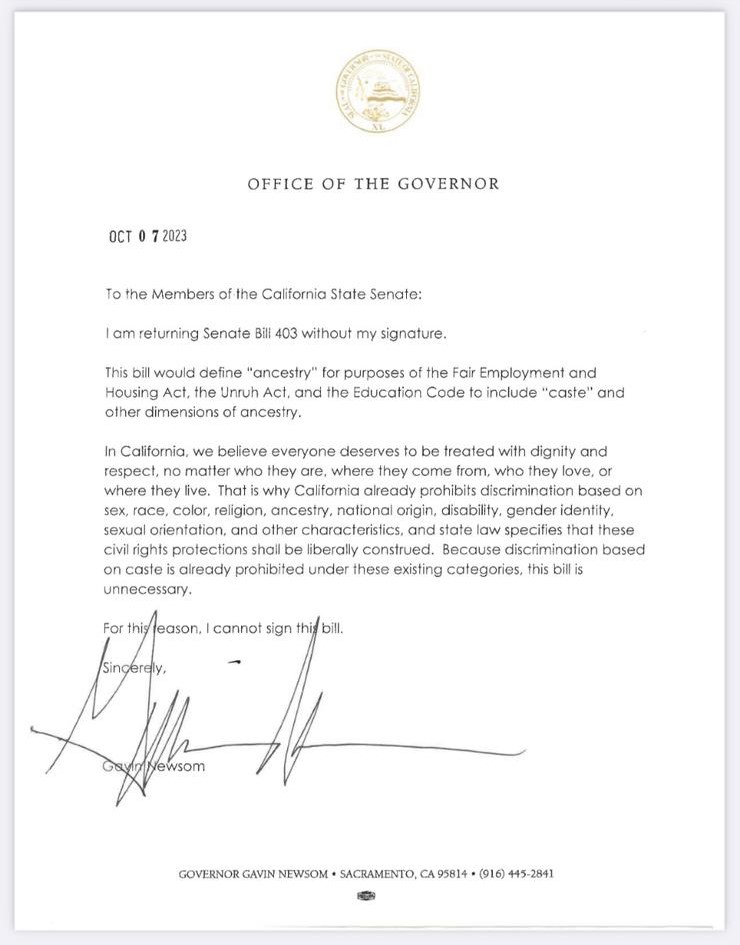MORE COVERAGE
Twitter Coverage
Satyaagrah
Written on
Satyaagrah
Written on
Satyaagrah
Written on
Satyaagrah
Written on
Satyaagrah
Written on
JOIN SATYAAGRAH SOCIAL MEDIA
Governor Newsom triumphantly returns the baseless Hinduphobic SB403, a bold move applaudable in its wisdom, and to the disgruntled supporters: Sometimes, the mirror reflects uncomfortable truths, here's a toast to discernment and genuine fairness!

In a move marking a decisive stance against discrimination, Governor Gavin Newsom of California rejected the contentious Bill ‘SB403’, labeling it both discriminatory and Hinduphobic. This decision, announced on Saturday, 7th October, showcases the state's unwavering commitment to upholding values of equality and justice.
|
Governor Newsom clarified his stance in a letter, highlighting that California's legal framework already encompasses comprehensive prohibitions against discrimination based on a myriad of factors. These include sex, race, colour, religion, ancestry, national origin, disability, gender identity, and sexual orientation, among others. Consequently, he found the new bill redundant, rendering its implementation unnecessary.
The bill in question, spearheaded by Senator Aisha Wahab, was titled “Discrimination on the basis of ancestry”. While it managed to garner approval from the California State Assembly on 29th August, with 50 members voting 'Aye' and a mere 3 dissenting, the bill met its halt with the Governor's veto. Such a decision underscores the existing robustness of California's anti-discrimination laws and the state's determination to avoid redundant legislations.
Governor Newsom's decision serves as a testament to California's long-standing pledge to champion the rights of its diverse populace, ensuring no individual or community feels marginalized or unfairly targeted. In times where divisive politics can cloud judgment, California stands firm, spotlighting the importance of equality, unity, and the rule of law.
 |
| Source: Gov.ca.gov |
Governor Gavin Newsom of California recently provided clarity on his decision to return Senate Bill 403. In a detailed letter addressed to the members of the California State Senate, Newsom illustrated the depth and breadth of the state's dedication to anti-discrimination efforts.
The content of the letter clearly emphasized California's overarching commitment to the dignity and respect of every individual. “In California,” Governor Newsom wrote, “we believe everyone deserves to be treated with dignity and respect, no matter who they are, where they come from, who they love, or where they live.” It is on these core principles that the state has established a broad spectrum of anti-discrimination laws.
Governor Newsom’s letter further highlighted that Senate Bill 403's intent was to explicitly include “caste” within the definition of “ancestry” as per the Fair Employment and Housing Act, the Unruh Act, and the Education Code. However, he pointed out that the state’s existing legal infrastructure is already comprehensive. The current laws in California prohibit discrimination on a plethora of grounds, including but not limited to sex, race, colour, religion, ancestry, national origin, disability, gender identity, and sexual orientation. These protections, as per the Governor's assertion, are meant to be “liberally construed”, implying a wide and inclusive interpretation.
Given that “caste” would implicitly fall under one or more of the categories previously mentioned, especially ‘ancestry’ and ‘national origin’, Governor Newsom deemed Senate Bill 403 as surplus to requirements. His message encapsulated the essence of California’s approach to civil rights – comprehensive, forward-thinking, and striving for inclusivity at every turn.
|
Hindu Groups Laud Governor Newsom's Stand on SB403
Governor Gavin Newsom’s decision to return Senate Bill 403 has been met with wide appreciation, particularly from Hindu organizations that had expressed concerns about the bill.
The Hindu American Foundation, a prominent representative of the community, was among the first to publicly acknowledge and commend Governor Newsom's stance. In an official statement, the foundation deemed this as a "victory of the civil rights of all Californians." Such sentiments reflect the broader sense of relief and gratitude in the community, which saw the bill as potentially problematic and discriminatory.
For many Hindu Californians, Governor Newsom's decision not only exemplifies his commitment to the already comprehensive anti-discrimination laws of the state but also reassures the Hindu community of their valued place in California's diverse tapestry. The veto, in this context, is not just a political act but a strong statement against the potential marginalization of any group based on their ancestry or religious beliefs.
With the current state of events, it's evident that while new bills and amendments may come and go, California's commitment to the protection of its citizens' rights remains unwavering.
|
Hindu American Foundation Praises Governor Newsom's Veto on SB403
Governor Gavin Newsom's veto of Senate Bill 403 has resonated positively within the Hindu community in California, especially among leading representatives from the Hindu American Foundation (HAF).
Samir Kalra, HAF’s Managing Director, hailed the Governor's decision as a momentous step towards preserving civil rights. Kalra remarked, “Governor Newsom has forestalled a potentially discriminatory move that could have unfairly targeted Californians based on their ethnicity or religious identity.” He went on to express his gratitude to the Governor for recognizing and acting upon the concerns stemming from perceived racial undertones and potential misrepresentations of the Hindu and the broader South Asian community.
|
In a similarly heartfelt statement, HAF Executive Director Suhag Shukla shed light on the community’s efforts to rally against the bill. Shukla elaborated on the community's collective journey — from awareness campaigns to peaceful protests and from community trainings to legislative correspondence. “SB-403 compelled our community to vocalize its concerns and rights,” Shukla noted, celebrating the collaborative spirit of Hindu Americans and their allies throughout the state.
Adding to her statement, Shukla reaffirmed HAF’s commitment to battling discrimination of all kinds. She envisioned a united front, emphasizing on joining hands with everyone, irrespective of the divisions SB403 might have created.
Governor Newsom's veto, backed by the outpouring of support from organizations like HAF, reinforces California's dedication to ensuring that every individual, regardless of their background, enjoys equal rights and protection under the law.
Pt Satish K Sharma, a renowned author and Hindu rights activist, took to social media to extend his gratitude. Sharma's message read, “Thank you Gavin Newsom for the courageous decision to return #SB403 and prevent hatred of Hindus from becoming state policy. Great work California Hindus!”
|
Furthermore, the Coalition of Hindus of North America (CoHNA) joined in the chorus of approval. In a statement, CoHNA expressed, “Delighted to see sanity prevail in #California. Thank you Gavin Newsom for vetoing #SB403. A victory for common sense, for American laws and a win for those who fought for #justice.”
The combined accolades from significant stakeholders within the Hindu community emphasize a shared sentiment of relief and gratitude. This collective voice underscores the belief that California remains a beacon of inclusivity and fairness, championing the rights and sentiments of its diverse populace.
|
The community's overwhelming response to the veto of Senate Bill 403 demonstrates the collective resolve of Hindu Americans in California. This isn't just about the efforts of a few but is reflective of the combined dedication of numerous Hindu organizations, temples, businesses, and supportive allies who rallied against profiling based on religious beliefs.
With pride and a sense of accomplishment, community voices state, “This is a culmination of the efforts of the entire #HinduAmerican community... We rose above the lies, the insinuations, and the wild accusations – and we prevailed." The collective endeavor spanned across months, including widespread organizing, educating, reaching out to legislators, and sending hundreds of thousands of emails and letters. The marches to Sacramento, numerous hours of testimonies, and substantial backing from key legislators made all the difference. The community champions assert, "To everyone who put in the effort, this is your victory. And that of Dharma.”
However, not everyone shares in this sentiment. Equality Labs, an organization that championed the bill, felt the sting of disappointment. Thenmozhi Soundararajan, Executive Director of Equality Labs, referred to Governor Newsom’s veto as “heartbreaking”. However, she took a moment to praise the democratic spirit, saying it's “not a reflection of the incredible democratic power that our communities showed.”
The veto and the subsequent responses illuminate the powerful currents of democracy, where diverse voices vie for understanding and recognition, showcasing the vibrant tapestry of beliefs and values within the Californian community.
|
As Governor Newsom confidently returned the so-called "progressive" Senate Bill 403, some of its most ardent supporters couldn't contain their "shock" and "disappointment." But perhaps it's time to delve into who these supporters really are.
Leading the chorus of disapproval was none other than the Indian American Muslim Council (IAMC). Shocking, isn't it? A group with eyebrow-raising connections to Islamic terrorist organizations suddenly becoming champions for caste discrimination in California. They professed to be “shocked, disheartened, and deeply disappointed” over the Governor’s decision. Yes, because their record of affiliations surely grants them the moral high ground here.
Meanwhile, the Soros-funded Sikh Coalition, having conveniently found its voice, leaped into the fray. They claimed to "know firsthand the pain and trauma" of being targeted by hate. Ironic, given that the Sikh faith, rooted in principles of equality and unity, explicitly condemns caste discrimination. Yet, here they were, advocating for a bill that was both redundant and divisive.
The Coalition lamented that despite their rallying cries and urging Governor Newsom to sign, he saw through the façade. Perhaps he realized that a bill so controversial and needless wasn’t in California’s best interest.
In the end, Newsom's veto of Senate Bill 403 peeled back the curtain, exposing certain groups' not-so-hidden agendas and alliances. California, known for its progressiveness and forward-thinking, will undoubtedly continue its march towards genuine equality, but perhaps without the unhelpful interference of those with questionable intentions.
|
Unmasking the Motives Behind SB403: A Shaky Foundation
The tale of the infamous SB403, touted as an "anti-caste discrimination" legislation, reveals a perplexing journey through California's legislative corridors. Spearheaded by Senator Aisha Wahab, one might wonder about the true motivation behind this endeavor. Given the bill's adamant support from the contentious organization, Equality Labs, it certainly raises a few eyebrows.
In an almost comedic twist, the very foundation on which SB403 stood – the Cisco caste case – crumbled spectacularly in January 2023. The case, which was paraded around as the primary catalyst for the bill, proved to be ineffective in court. But, rather astonishingly, even with the case collapsing, the California State Assembly decided to move ahead, giving the green signal to the bill.
It's curious how a bill, standing on such shaky ground, made its way this far. Was it political ambition? Was it underhanded strategies by dubious organizations? Or was it an earnest, albeit misguided, effort to address a problem that was already covered under existing laws? Whatever the reason, SB403's journey serves as a stark reminder of the complex interplay of politics, ambition, and hidden agendas that sometimes cloud the legislative process.
Caste discrimination case against Indian origin CISCO engineers in USA dismissed after no evidence was found
In what can only be described as a classic slapstick comedy, the relentless efforts of some overly enthusiastic organizations to demonize an entire community came tumbling down. Let's dive into this riveting tale of the notorious 'caste discrimination' case that has left many scratching their heads.
Our story begins with the California Civil Rights Department (CRD) - an organization that seemingly loves to play detective. Eager to prove that the Indian diaspora was drowning in caste prejudices, they pulled out all the stops against two unsuspecting engineers from CISCO, Sundar Iyer and Ramana Kompella. The charges? Allegedly discriminating against a ‘self-identifying Dalit’. But here's the twist in the plot: Iyer had actually hired this 'victim' with an enviable package that would make any Silicon Valley techie green with envy. And for good measure, he also brought on board another ‘self-identifying Dalit’ into a leadership position. Quite the evil mastermind, isn’t he?
What's even more comical is how CRD, without batting an eyelid, portrayed the Indian community as 'xenophobic'. Perhaps they overlooked the small detail of Indian communities being one of the most diverse and multicultural groups globally. Or maybe, they were just looking to add a bit of drama to their narrative.
|
But the icing on the cake? The entire case was tossed out in April! The reason? Oh, just the minor detail of there being no evidence. One might wonder if the CRD had mistaken their roles for participating in a theatrical farce instead of a serious legal investigation.
Moral of the story: If you're going to champion a cause, maybe start with one that isn't built on a house of cards. And for the organizations that tried to milk the CISCO case to further their Hinduphobic agenda, better luck next time! Maybe stick to comedy, it seems to come naturally.
In a twist of the CISCO discrimination saga, it seems the California Civil Rights Department (CRD) might have been indulging in a bit of selective vision. The ever-vigilant Hindu American Foundation (HAF) did a bit of their own sleuthing, and what they found would make Sherlock proud.
Digging through court filings, HAF unearthed the fact that the CRD, in all its wisdom, was fully aware of the diverse environment at CISCO and more so in Sundar Iyer's division. And while we're on the subject of Iyer, the supposed 'discriminator' had been publicly identifying as an ‘agnostic’ for over two decades. But wait, there's more! The CRD, in what can only be described as a masterclass in jumping to conclusions, labeled him as a ‘Hindu’ and rested their assumptions on the rather 'reliable' reports by Equality Labs, run by the ever-controversial Thenmozi Soundarajan.
Adding to the intrigue, the ‘self-identifying Dalit’ had been with the company for nearly a decade before he sounded the discrimination alarms. When the dust finally settled, CRD, with all their might and resources, couldn’t pin a shred of evidence on the two CISCO engineers that hinted at harassment.
It's almost like watching a detective movie where the investigator focuses on the red herrings while the real plot unravels elsewhere. One can't help but wonder if the CRD was a bit too keen on writing their own narrative, even if it meant ignoring the blatant facts.
|
In the cinematic climax to the CISCO discrimination melodrama, HAF Director Suhag A Shukla stepped into the spotlight with a message that resonated louder than the thunderous applause of a Hollywood movie ending. "It's over folks," she declared, a hint of triumphant vindication in her voice, addressing the lawsuit against the two Indian-American engineers at CISCO. Their supposed crime? Being born Indian & Hindu, and thus being slapped with a presumption of discrimination based on caste.
Shukla's words painted a vivid picture of the long ordeal, hinting at the sheer absurdity and prejudice in play. "The nightmare endured is beyond imaginable & a cautionary tale for what awaits in California over caste," she remarked, a subtle nudge at the darker undertones of the case. But here's the zinger - the alleged victim wasn't just a passing acquaintance of Sundar Iyer; they were old pals from their IIT days, going back over two decades!
The juiciest tidbit saved for the end reveals that the ‘caste discrimination’ case against the CISCO engineers wasn't just a standalone drama. Oh no, this tale had ripples. Eager 'activists' conveniently weaponized this case as a poster child, pushing forward their agendas and driving resolutions to inject 'caste' into non-discrimination policies across the board. The plot, it seems, was much thicker than anyone imagined.
So, as the curtains fall on this tumultuous saga, one thing stands clear: the truth, much like cream, always rises to the top. And as it does, it exposes the myriad layers of manipulation, bias, and prejudice lurking beneath.
 Support Us
Support Us
Satyagraha was born from the heart of our land, with an undying aim to unveil the true essence of Bharat. It seeks to illuminate the hidden tales of our valiant freedom fighters and the rich chronicles that haven't yet sung their complete melody in the mainstream.
While platforms like NDTV and 'The Wire' effortlessly garner funds under the banner of safeguarding democracy, we at Satyagraha walk a different path. Our strength and resonance come from you. In this journey to weave a stronger Bharat, every little contribution amplifies our voice. Let's come together, contribute as you can, and champion the true spirit of our nation.
 |  |  |
| ICICI Bank of Satyaagrah | Razorpay Bank of Satyaagrah | PayPal Bank of Satyaagrah - For International Payments |
If all above doesn't work, then try the LINK below:
Please share the article on other platforms
DISCLAIMER: The author is solely responsible for the views expressed in this article. The author carries the responsibility for citing and/or licensing of images utilized within the text. The website also frequently uses non-commercial images for representational purposes only in line with the article. We are not responsible for the authenticity of such images. If some images have a copyright issue, we request the person/entity to contact us at This email address is being protected from spambots. You need JavaScript enabled to view it. and we will take the necessary actions to resolve the issue.
Related Articles
- Naomi Barton Wire journalist accused of instigating violence against Hindus in hijab row had earlier shamed Hindu girl welcoming new dog with Puja and also abused Shri Ram
- Infuriated Islamic organisation files Petition in SC against alleged hate speeches against Muslims and Prophet Mohammad, seeks court-monitored probe
- “Hindus are Satans, will only get misery if not pray to Jesus. Follow Christianity for Good marks": Missionaries in Tamil Nadu repeatedly luring school students to follow Christianity even after Lavanya's suicide
- Maulana Usmani says Muslims must continue to defend the honour of the Prophet without fear, terms it ‘peaceful mission’: Old videos show how Maulana was greeted with chants of ‘Sar Tan Se Juda’
- Ever since news of Shivling inside Gyanvapi complex in Varanasi came out Hindus are celebrating whereas Islamists on the expected line suffering a huge meltdown
- Christian evangelists threatens Tamil Nadu RSS worker Ganesh Babu with bogus charges under SC/ST Act for complaining against religious conversions
- The true face of Saba Naqvi: How the ‘secular journalist’ supported Muslims acts of violence and fanaticism on Ram Sevaks in Sabarmati Express burning leading to gruesome killing of some 59 innocent people, including 25 women and 15 children
- "Better to fight for something than live for nothing": 'Hindu on Campus' batch exposed to online assault, faces slanderous attack by Hindu Students Association of American University, often been targeted by Islamists and the cabal of leftists and liberals
- Devkinandan Thakur's statement is a slap in the face of the Islamist hoodlum from Hyderabad - “Many more Yogis and Modis standing in line…”
- Tales of Fraud, funding, forced religious conversion and insulting Hindu gods and goddesses after brainwashing: How tribals were converted to Islam in Gujrat - “Aapka paigam London pahucha diya hai, achha kaam ho raha hai"
- “Misunderstanding arising from ignorance breeds fear, and fear remains the greatest enemy of peace”: Amidst rising Hindumisia, a resolution passed in the US to label various Hindu organizations as ‘severe hate groups’, ‘offshoots of RSS’
- Just a few months before the raging Hijab controversy, Muslim residents of Udupi had boycotted local fishermen for participating in a mega Padayatra to protest against illegal theft and slaughter of cows
- 23 Jan to 29 Jan - 2022 - Hindus under attack: Bulletin roundup of persecution, discrimination, and hate crimes against Hindus
- Mohammedans trying to shield culprits of anti-Hindu atrocities by spreading paranoia over Bajrang Dal rally in Haryana’s ‘Mini Pakistan’
- Supreme Court allows same Muslim brothers to rent temple properties who have wrecked mayhem in Srisailam temple

























